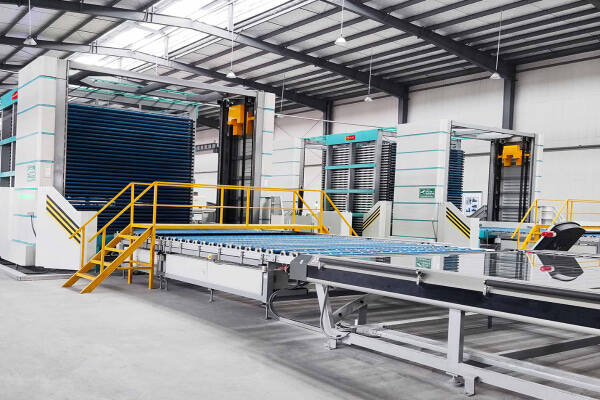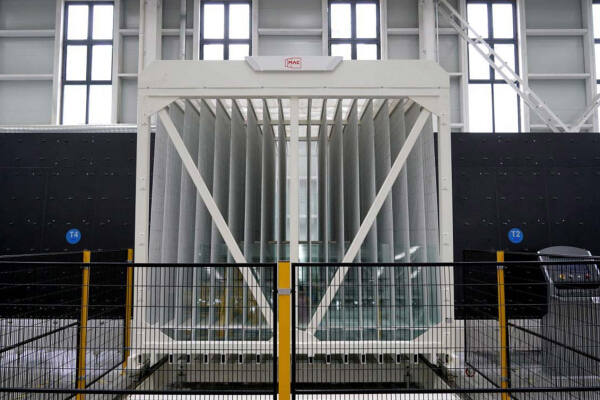Subtitle: Empowering Factories with an Intelligent Brain, Giving Glass a New Identity, and Introducing a Higher Production Value
The deep glass processing industry is undergoing a significant transformation: from disorder to order, from passive processing to proactive management, and from risk to safety. This evolution has led to improved product quality control, optimized efficiency, reduced energy consumption and labor involvement, enhanced production management and upgraded safety in production. Today, we explore the intelligent production of deep glass processing and how MAC empowers smart glass factories.

Upgrading to a smart factory usually involves three steps.
The first step is management upgrading, transitioning from traditional extensive management to one that bases investment on market analysis, analyzes capacity according to order structure, determines pricing based on actual losses, and optimizes capacity through lean processes to reduce costs.
The second step is automation upgrading, where optimizing factory logistics and achieving efficient automation and intelligence significantly improve product quality and reduce labor’s involvement.
Intelligent raw glass storage system, intermediate product storage system, and finished product storage system.
Intelligent marking system and identification system.
Intelligent furnace batching system.
Intelligent sorting and pairing system.
Automated conveying mechanism.
The third step is functional machines upgrading. Truly intelligent machines represent the ultimate challenge for a smart factory, requiring an in-depth analysis of processes and absolute control over production.
Fully automatic edging and pre-processing equipment upgrades
Intelligent tempering furnace
Fully automated smart insulating glass production modules
Based on the three-step approach mentioned above, we must begin a new journey towards intelligence starting with software.
Software Upgrade
ERP serves as the core database for a deep glass processing factory, covers a series of functional modules ranging from sales order, procurement, material management, production, and dispatch to finance. However, traditional ERP systems do not include production modules and are not able to effectively manage processing equipment. For instance, when handling complex glass orders (such as a set of insulating glass with 5mm tempered glass + 0.38mm PVB interlayer + 5mm tempered glass + 6mm aluminum spacer + 5mm LOW-E glass), traditional ERP systems cannot define each piece of glass or material, making it impossible to achieve true order management and tracking.
In contrast, MAC's ERP is a specialized system developed specifically for deep glass processing equipment. It seamlessly manages and tracks each piece of glass in complex orders.
A factory-wide ERP+MES system can even effectively manage each processing equipment, optimize orders, and decompose them into independent equipment instructions, processing them in a language the equipment can understand.
By extracting production data from the ERP+MES system, calculating the effective capacity of each individual equipment and the actual cost of each order becomes much easier.

Next is the logistics optimization stage. A typical example of this is optimizing the process from raw glass storage to cutting.
Every piece of raw glass begins its journey through the processing plant with cutting. Before cutting, ensuring the correct and efficient identification of the corresponding glass is one of the production steps that require improvement. Based on the order information in the ERP system, the glass is optimized and coordinated between raw glass storage system and the cutting machine, ensuring smooth subsequent processing. This process acts as a powerful brain for the glass warehouse, enhancing the optimization rate by 3% to 5% by combining online and offline glass storage information. Through an automated raw glass conveying system, the glass can be safely and efficiently transported to the cutting line.
The intelligent cutting line represents a significant evolution from traditional cutting line. Traditional cutting line can only cut according to optimization packages, while the cutting line in an intelligent factory assigns an identity to each piece of glass. This can be achieved by adding an independent laser marking machine or replace traditional cutting line to a two-in-one laser marking and cutting machine.

At the same time, we can also achieve intelligent connection from cutting to edging.
After cutting, glass pieces are usually in a disorganized state, and orders are scattered. Glass of the same thickness but different sizes must be reorganized without unloading to glass racks and directly balanced with the production rhythm of the cutting and edging machines before entering the edging machine. To achieve maximum efficiency in edging and reduce quality issues or safety risks caused by manual intervention, a horizontal sorting system can be used for glass sorting and conveying. Different SOLUTIONS are required depending on the type of edging, such as horizontal seaming machine or double edger.

Let’s explore Intelligent Connection from Edging to Tempering
The concept in this stage is similar to above, but now we need to handle the layout of multiple glass pieces and feed them into the tempering furnace. Depending on the customer's order structure and the available space, MAC can provide either horizontal or vertical sorting system. Additional components such as ladders, shuttle systems, and multiple sorting crates are needed to manage the transition from handling single glass pieces to multiple pieces. The logic for batching glasses before tempering includes several options, such as maximizing the loading rate of the tempering furnace, order priority, optimizing quality, and ensuring the highest efficiency. These tasks require powerful logic algorithms and reliable mechanical equipment to execute effectively.

Furthermore, the sorting system also plays a significant role in energy saving. In regions with varying electricity rates, different processing operations can be scheduled at different times. For instance, in China, intelligent factories can complete most of the tempering work at night and store the tempered glass in sorting crates for use in the production of insulated or laminated glass during the daytime. Without an intelligent sorting system, achieving this level of efficiency without increasing labor would be impossible.
Intelligent Connection from Tempering to Insulated and Laminated Glass Production

This stage once again highlights the powerful capabilities of MAC's software system. As the variety of glass types increases, along with the complexity of sizes, thicknesses, and combinations, managing orders becomes increasingly challenging. MAC's sorting system can automatically identify and match different types of glass, guiding them to the insulated or laminated glass production lines, even freely manage complicated laminated and insulated glass orders. The intelligent factory breaks through traditional production bottlenecks, effectively solving issues related to glass quality control, matching/pairing, and order tracking.
Before the advent of computers, we could never have imagined the profound changes they would bring. Similarly, the emergence of a smart factory will usher in a transformative industrial revolution.
As Shakespeare's Hamlet suggests, there can be as many different solutions as there are smart factories. We offer 100% customized solutions to help each client excel in their area of expertise. Whether you are involved in architectural glass, shower doors, appliance glass, automotive glass, or photovoltaic glass, we can provide tailored solutions for you. This is all made possible by our powerful software system that integrates each functional device. The MAC team is ready to offer you even more comprehensive solutions in the future.
In the factories of the future, every piece of glass, every glass rack, every worker, every machine, and every consumable will be traceable. Their origins and destinations,their OEE will be transparent. There will be no secrets in the future factory, only real data. Are you ready to engage with data?
Copyright © 2025 China MAC GLASTECH AND AUTOMATION CO.,LIMITED. All rights reserved — Privacy Policy